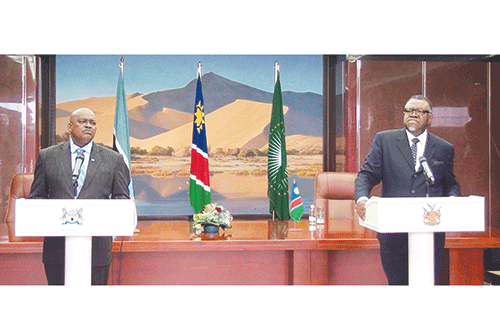George Sanzila
Parliament has recommended that the Ministry of Defence and Veterans Affairs increase its border patrols along the shared border with neighbouring Botswana to prevent the wanton killings of innocent Namibians by the Botswana Defence Force (BDF).
Parliament has further urged for a diplomatic intervention by appealing to President Hage Geingob to address the Zambezi security issue through the Namibia-Botswana Joint Commission, and the Ministry of International Relations and Cooperation to establish a consulate office in Kasane, Botswana to provide swift consular services and improve relations between the two countries.
These recommendations are contained in a comprehensive report by the Parliamentary Standing Committee on Foreign Affairs, Defence and Security which was recently tabled in the National Assembly. The tabling of the report follows a fact-finding mission by the committee to the Zambezi region in 2022, which was prompted by the increase in the number of shootings and harassments of Namibian citizens living along the border by the BDF on suspicion of being poachers. It is estimated that over 30 Namibians have lost their lives so far at the hands of the BDF since independence. Indigenous people of both countries, living alongside each other, depend on the shared river system for their livelihoods. For those in Namibia, however, this has turned out to become their death trap.
Boiling point
The situation reached boiling point in November 2020 when three fishermen brothers, together with their Zambian cousin, were shot dead by the BDF after they were suspected of being poachers. The incident attracted a lot of attention, and pitted citizens of the two countries against each other. It further brought to the fore the controversial boundary treaty signed between the two countries in 2018. That treaty has been heavily criticised by Zambezi residents, including the traditional authorities, for lacking consultation.
During the committee’s visit to the region, Zambezi regional governor Lawrence Sampofu revealed that communities which were most affected were residents of the Kabbe South, Linyanti and Judea Lyabboloma constituencies. “There are reports of harassment, intimidation and shootings by the BDF. People are also not happy with the boundary treaty signed as it does not affirm the existing borders, but instead creates new borders with invisible coordinates on the Namibian side,” he added.
Similar sentiments were shared by the traditional authorities, including the Namibian Lives Matter (NLM) pressure group. They stated that the 2018 border treaty was largely to blame for the hostilities, and that it should be reversed and a consulate office opened to assist in improving relations. “The treaty gave birth to harsh intimidations experienced by the inhabitants today. We further believe that all these incidents could be averted if government opens a consular office in Kasane, Botswana, as was done in Ondjiva, Angola. This can serve as a point of contact to receive, record and respond to panic alerts,” suggested NLM. Residents further complained that victims of BDF shootings were not assisted by the government.
Boundary treaty of 2018
The Ministry of International Relations and Cooperation was adamant during consultations that despite the criticisms, the treaty has not come into force due to a number of pending issues. They stated that the treaty can only become enforceable once an original copy of the treaty has been deposited with the Secretary General of the United Nations, the African Union and the Southern African Development Community. It was revealed that although Botswana appears to be implementing the treaty, Namibia had not yet deposited such instruments, as it is yet to finalise a number of bilateral and other stand-alone agreements, including the Standard Operating Procedures, and the delimitation of the Kazungula Tri-Point which would also involve Zambia.
The committee further revealed that according to the evidence it has uncovered, the said boundary treaty did not create new borders, but rather confirmed the boundary which already existed. During consultations, community members and law-enforcement agencies noted that the non-visibility of beacons in areas along the borderline has likewise greatly contributed to incidents of arrests, harassments and shootings of Namibians. They implored government to sensitise community members about the borderline.
*George Sanzila works for the National Assembly in the Division: Research, Information and Editorial Services.



